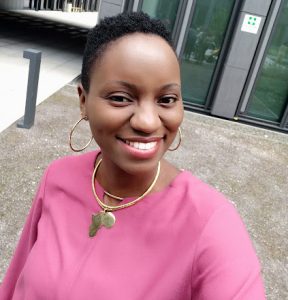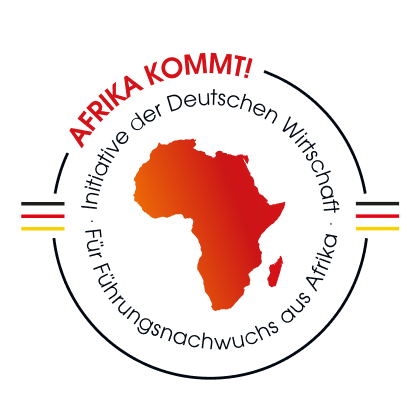HAVE YOU MET MARXINE WAITE?

Could you briefly introduce yourself?
My name is Marxine Waite. I come from Kenya, and I am a sustainability professional. This is what I do and what I love. In my everyday job I train and support companies to integrate sustainability into their business operations: the actual internal business itself for example regarding sustainability policies, action plans, employee engagement and environmental management, working with their supply chain, and also interaction with their customers to influence them to make more sustainable choices.
Using three words, how would you describe your first three months in Bonn and Germany?
 The words would be ‘exciting’, ‘informative’ and ‘a little confusing’.
The words would be ‘exciting’, ‘informative’ and ‘a little confusing’.
I would say very informative because I got to learn a lot about the German culture. It is very different from what I was expecting because we always have that stereotypical thing – at least in my country – that Germans do not laugh a lot. But I met so many friendly people here.. Even with the language barrier– if you just ask, it is easy to get some help. I also got to meet a lot of people from many different countries: I thought I would be surrounded only by Germans, but in Bonn there is such a variety of different people from different countries. I think I know more foreigners in Bonn than Germans!
It is also exciting because I got to meet people from the AK group, AK10 and AK9. They are professionals from all over Africa, and I have enjoyed getting to learn about their culture, where they come from, about their different professions. The best part is knowing we are all in this together with a joint goal of wanting to do better, not only for professional growth, but also for our countries. It has been a very intriguing journey to get to know them, to learn from all of them, and to eat their food! I am big on food, so I have tried for the very first time a lot of different foods from different countries.
And it is confusing, like I said: I thought that everything would be online, tech- advanced and paperless. I was amazed by the amount of paperwork that I have been confronted with. I just do not know why, but Germans still use a lot of hard copies, for example for my bank documents. It has been an endless stream of responding and forwarding actual written letters. I really did not expect that! I also thought everywhere in Europe you get a white Christmas but, surprise, the weather here is very mild. I was a bit confused about that because I thought it is a standard thing in cold climate regions. The TV shows we grew up watching, really oversold this white Christmas phenomenon.
Which cultural aspect do you find especially interesting?
There is the transportation system. That was incredible for me because, while we have the same Google Maps in Kenya – it is the same app in Germany and in Africa – it functions completely different here. It is interesting to see that you can actually use public transportation with your Google Maps and it will tell you exactly which bus, what time it leaves and how long it will take you to go to point B. That was fantastic, because I thought I would definitely get lost in my first days here because of the language barrier, but I think the app is really useful.
In terms of the culture, apart from the paperwork, there is the food – especially bread. I did not think it was possible to have so many different types of bread. The first time I went shopping and just wanted to get bread, I thought it would be easy to just pick one, but it was very overwhelming. So what I do now is, because I am experimental, I just close my eyes and whatever I touch that is what I will eat for the day.
How do you spend your free time in Bonn?
I like taking walks and hiking. I have not done mayor hikes since we came here but I have gone for long walks. There is a lot of nice, interesting green spaces just within Bonn, where you can take your long walks.
I have also visited Liège in Belgium, and Luxemburg and we went to that little city of Cochem, and to visit the longest suspended bridge in Germany, a ‘Hängeseilbrücke’. It was also interesting to visit the Christmas markets in different cities in Germany. Did you know they had a Kenyan Stand at the Bonn Christmas Market? It was lovely to shop for some things from home right in Bonn!
I also find the history museum very interesting if you want to learn more about Germany.
Which aspect do you find especially interesting regarding the German language?
I have mixed feelings for the German Language. It is not easy to learn this language, but I also embrace it, as I do enjoy a good challenge. I find that there are too many rules and again, surprisingly, too many exceptions to the rules, within just one language. So the grammar can be quite challenging, but the more you speak it and the more you listen to people speaking, the easier it becomes because then you sort of stop thinking about the grammar. It becomes more natural. I think what really helped me, apart from the German classes, is that I watched cartoons: I watched a ton of German cartoons, including Pepper Wutz.
Do you have a chance to make use of your German outside the language course?
Oh yes! I practice everywhere because this is the only way to be comfortable enough. For example, if I go shopping or if I go to the bakery, I will use my German. It might not be perfect, but at least people can see you are trying. Some people will correct you, others will just smile and change the language to English if you mess up completely, but I really do try to use it every chance I get.
What are you generel expectation towards the company phase?
I expect it to be a bit challenging because it is a completely new working environment. But I am prepared for it to be challenging. I have never worked with a company of this size, they are in 65 countries with over 60,000 employees. It is big, and the projects that I am joining are also quite big.
There will be a lot of learning involved, which is good because, for me, it felt like that this is the next natural step in my career: I started with doing environmental education for children and then worked in the tourism industry by supporting companies in sustainability and environmental management. That is where I built a good foundation in sustainability strategy and working with international teams. That even enabled me to start a sustainability consultancy. For this next step in my carreer, I envision further learning, growing my network and gaining experiences in a large complex corporate.
I expect of course to make impact: I believe sustainability is for everybody, whether you are a manager or a clerk or you are in procurement, in supply,… it really does not matter. I believe that we can make a mark and with a big company like B.Braun, imagine the potential positive impact that can be made across the globe.
I hope to network with a lot of people, to make meaningful connections, to create possible partnerships. I hope to be a great ambassador for Kenya. As much as I am receiving in terms of the learning and growing professionally, I hope that it is a give and take and that I bring something to the table in terms of experience, knowledge, and a good spirit.
And I expect to have fun!
How can you enrich partner company?
B.Braun plans to expand their sustainability department. My experience really is in strategy and integration of sustainability into a company. The first project that I am going to work on is supporting them to design a training for all their departments worldwide, just to get everybody on board. This is something that I have done previously for other companies. They have already taken the first steps, but how can they touch possibly every employee and integrate them in order to contribute together towards the overall sustainability objectives of B.Braun?
How do you profit from the contact to your fellow Fellows?
I am learning a lot about different professions, what they do, and what they are passionate about. For example, when we were doing the expert exchange, I put myself deliberately in the disruptive technologies group. I know I am not in tech, but it is something I am really interested in, especially in the nexus of sustainability and technology. It was a funny thing because it was all with tech people. There were a lot of friction at the start because sometimes some people do not see how sustainability and technology are coming together. But eventually we could see the synergies and opportunities to work together. There is already a lot of networking between the fellows. They start to see synergies between the different professions and things they can do together to create impact, of course make money, too, but impact being the main thing.
Culturally, I had a sort of a re-awakening of my Africaness since I came here and interacted with all the fellows. When we were discussing the books about the history of Africa and how to decolonize Africa, you could sort of feel this new awakening of you as an African and feel that you need to re-embrace your roots. It is interesting because I sat back the other day and I thought it is interesting that I had to come all the way to Germany to reawaken this daughter-of-Africa feeling in me again, and it is beautiful. I feel more African now than when I landed.
This interview was conducted by Matthias Ogiermann. Matthias was an intern in the AFRIKA KOMMT! programme from October 2021 to March 2022. He studied Geography and Mathematics in Münster, focusing on Development Geography and International Cooperation.
He particularly enjoyed being an intern in the programme since it allowed him to meet many brilliant young leaders and visionaries from Africa and exchange with them about their ideas for sustainable development in both Europe and Africa. When not interning, he is enthusiastic about listening to podcasts and hiking – as a Geographer self-evidently without map and without getting lost.
